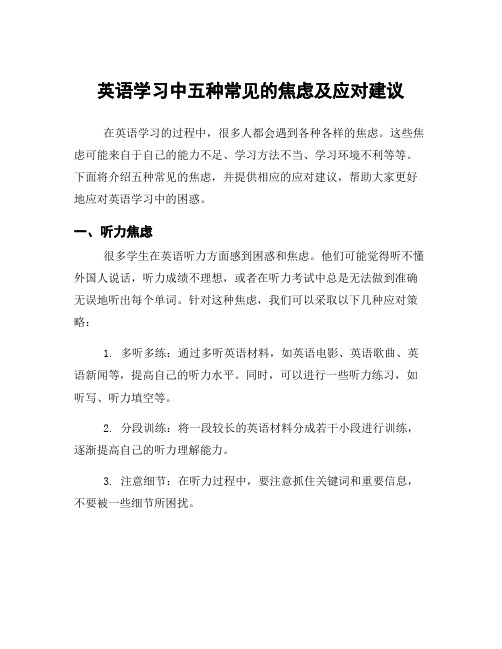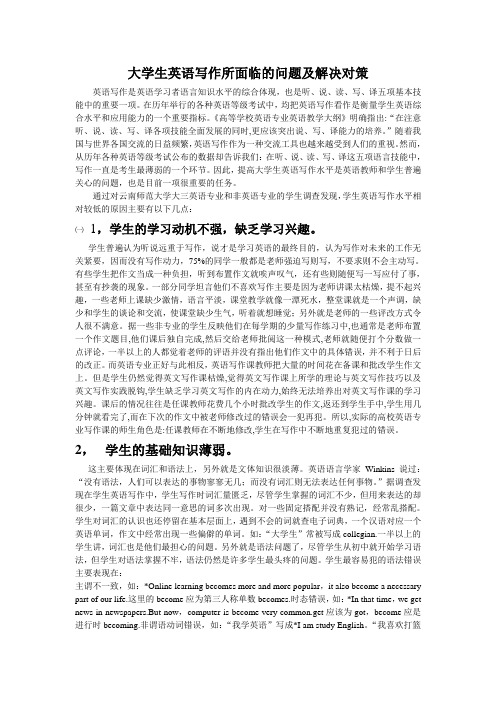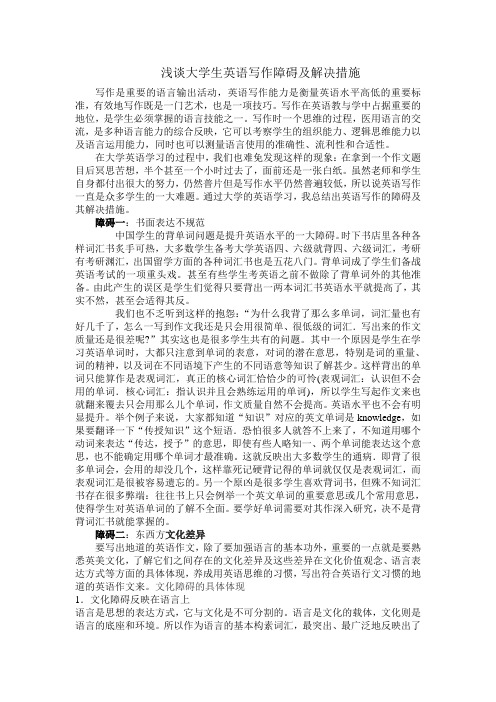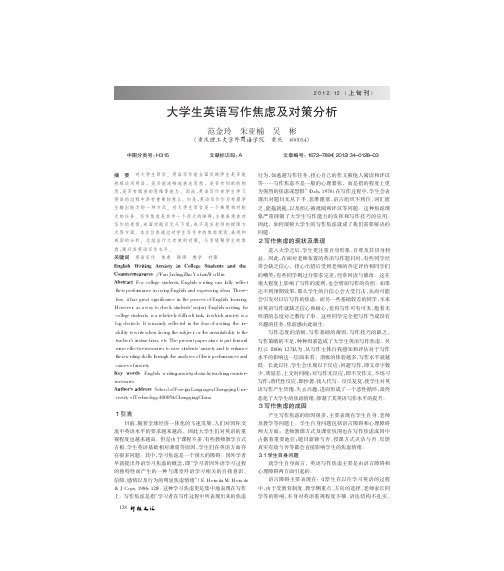大学生外语写作焦虑及应对措施
英语学习中五种常见的焦虑及应对建议

英语学习中五种常见的焦虑及应对建议在英语学习的过程中,很多人都会遇到各种各样的焦虑。
这些焦虑可能来自于自己的能力不足、学习方法不当、学习环境不利等等。
下面将介绍五种常见的焦虑,并提供相应的应对建议,帮助大家更好地应对英语学习中的困惑。
一、听力焦虑很多学生在英语听力方面感到困惑和焦虑。
他们可能觉得听不懂外国人说话,听力成绩不理想,或者在听力考试中总是无法做到准确无误地听出每个单词。
针对这种焦虑,我们可以采取以下几种应对策略:1. 多听多练:通过多听英语材料,如英语电影、英语歌曲、英语新闻等,提高自己的听力水平。
同时,可以进行一些听力练习,如听写、听力填空等。
2. 分段训练:将一段较长的英语材料分成若干小段进行训练,逐渐提高自己的听力理解能力。
3. 注意细节:在听力过程中,要注意抓住关键词和重要信息,不要被一些细节所困扰。
很多学生在英语口语方面感到焦虑,他们可能觉得自己的口语表达能力不足,无法流利地用英语进行交流。
针对这种焦虑,我们可以采取以下几种应对策略:1. 多说多练:通过多与他人进行英语口语交流,提高自己的口语表达能力。
可以参加英语角、找外教进行口语练习等。
2. 模仿学习:可以模仿一些标准的英语口音和表达方式,通过模仿来提高自己的口语水平。
3. 多积累词汇和句型:通过积累更多的词汇和常用句型,可以更好地表达自己的意思。
三、阅读焦虑很多学生在英语阅读方面感到困惑和焦虑。
他们可能觉得阅读速度慢,理解能力差,或者在阅读考试中总是无法做到准确无误地理解每个句子。
针对这种焦虑,我们可以采取以下几种应对策略:1. 多读多练:通过多读英语材料,如英语文章、英语小说等,提高自己的阅读水平。
同时,可以进行一些阅读练习,如阅读理解题等。
2. 划重点:在阅读过程中,要注意划重点,抓住关键词和重要信息。
3. 扩大词汇量:通过积累更多的词汇,可以更好地理解文章的意思。
很多学生在英语写作方面感到焦虑,他们可能觉得自己的写作能力不足,无法准确地表达自己的意思。
在大学如何处理焦虑和抑郁得英语作文

在大学如何处理焦虑和抑郁得英语作文全文共3篇示例,供读者参考篇1Dealing with Anxiety and Depression in CollegeCollege is meant to be one of the most exciting and transformative times in a young person's life. However, for many students, the pressure of academics, being away from home, making new friends, and figuring out their future can take a heavy toll on their mental health. Anxiety and depression are surprisingly common among college students, affecting up to 35% according to some studies. If you're struggling with either of these conditions, you're definitely not alone. Here are some tips from a fellow student on how to cope.The first step is to simply accept that you're having a tough time, rather than beating yourself up about it. Anxiety and depression are real medical conditions, not personal failings. Don't listen to the internalized voice telling you to just "suck it up" or "get over it." These are complex issues, often with biological and chemical roots in the brain, so be kind to yourself.Once you've accepted your situation, it's important to prioritize self-care activities that rejuvenate your mind and body. For me, this means getting enough sleep each night, even if it requires skipping that 3am pizza and Netflix binge with my roommates. It also means exercising regularly, whether that's hitting the campus gym, going for a run around the quads, or joining an intramural sports team. Exercise releases endorphins and other feel-good hormones that can elevate your mood.Another critical aspect of self-care is maintaining a balanced, nutritious diet as much as possible amidst a hectic class schedule. When my anxiety and depression are flaring up, it's easy to slip into eating mostly snacks and fast food. However, I notice a huge difference in my energy levels and overall disposition when I make an effort to eat plenty of fruits, veggies, lean proteins, and whole grains. It's also wise to limit alcohol, which is a depressant, and can exacerbate mental health issues.Of course, sometimes the most "self-caring" thing you can do is simply make time to relax and unwind through activities you enjoy. I love to read fiction as an escape from academic stress. Other friends find solace in creative hobbies like painting, journaling, or playing music. The key is identifying pastimes thatmelt your worries away and bring you serenity, at least for a little while.Another strategy I've found helpful is practicing mindfulness and meditation. This allows me to be present at the moment, rather than getting caught up in anxious thoughts about the future or depressive rumination about the past. There are many excellent meditation apps and YouTube videos to get started.I've also benefited from speaking to a counselor at the university's low-cost counseling center a few times to work through some of my anxieties and negative thought patterns.One of the toughest but most important things is being willing to ask for help and support when you need it. It's all too easy to isolate yourself when you're depressed, but that only breeds further loneliness. Reach out to close friends or family to talk about what you're going through. Perhaps join a student organization or club to meet new people with similar interests and values. Having a strong in-person social circle helps so much.It can also be valuable to seek professional help from the campus health center. They have resources like psychologists, therapists, psychiatrists, and support groups specifically for students dealing with anxiety, depression, and other mentalhealth concerns. Don't be afraid to use these services – they're there for you, and things often start improving with professional treatment.Medications like antidepressants may also help in some cases when used responsibly under a doctor's supervision. However, I'd advise caution about attempting to self-medicate with drugs or alcohol, as substance abuse will likely worsen your situation in the long run.For anxiety specifically, it really helps me to get organized with a planner or calendar to visually lay out all my assignments, exams, and commitments. This prevents everything from piling up unexpectedly. I also try to start assignments with plenty of time, as last-minute rushes exacerbate my anxiety greatly. Procrastination and I are not friends!When I'm feeling depressed, getting outside in nature is incredibly therapeutic for me, even if it's just a short walk around campus between classes. Soaking up some sunshine does wonders for improving my mood and mindset on difficult days. I'm fortunate that our university prioritizes green spaces and outdoor seating areas.Finally, be patient with yourself and trust that brighter days lie ahead. Anxiety and depression can arise situationally due tostressful periods, so your struggles may be temporary. But even if these are longer-term challenges, arming yourself with healthy coping strategies makes an immense difference in regaining your mental well-being. Don't lose hope – you've got this!篇2Dealing with Anxiety and Depression in College: A Student's PerspectiveCollege is meant to be one of the most exciting and transformative times in a young person's life. It's a chance to gain independence, explore new ideas, make lifelong friends, and pave the way for a rewarding career. However, for many students, the college experience is overshadowed by struggles with mental health issues like anxiety and depression.I know this all too well from personal experience. When I started my freshman year, I was overwhelmed by the massive changes – being on my own for the first time, meeting new people every day, and juggling a much more intense academic workload than high school. What began as typical teenage angst and adjustment issues spiraled into crushing anxiety and major depressive episodes that left me feeling hopeless and unable to function at times.The unfortunate reality is that stories like mine are increasingly common on college campuses across the country. A 2021 study found that 63% of students met the criteria for at least one mental health problem, with anxiety and depression being the most prevalent issues. The reasons are multi-faceted –many students are dealing with immense academic pressure, financial stress, loss of established social support systems, and the general identity crisis that comes with that transitional period of life.From my own hard-fought journey to find balance and treat my anxiety and depression, I've learned some valuable lessons that I hope can help other students struggling with similar challenges. Here are my keys to managing mental health in the high-stress, high-stakes environment of college:Prioritize Self-CareIt sounds simple, but making self-care a top priority is absolutely crucial when your mental health is suffering. For me, that means getting enough sleep (admittedly still a work in progress), eating nutritious meals, exercising regularly, and taking breaks from schoolwork to read, journal, or just veg out and watch Netflix. Find what self-care activities restore you and make them non-negotiable parts of your routine.Build a Support SystemHuman beings are psychologically wired to need social connections and a sense of belonging. Having a strong support system of friends, family, mentors, and professional counselors to lean on can make a world of difference when you're in the depths of depression or a spiral of anxiety. Don't be afraid to open up – you'll likely find that many others are dealing with similar struggles.Seek Professional HelpThere's no shame in admitting you need professional help to cope with anxiety, depression, or other mental health issues. Most colleges have affordable counseling services available, or you may need to seek care from a therapist, psychologist, or psychiatrist off-campus. Therapy, medication, or a combination of both can be life-changing. It's also important to take advantage of accommodations for mental health disabilities.Be Kind to YourselfDealing with a mental illness on top of all the other stressors of college is extremely difficult. Don't beat yourself up further when you're having a hard day or week. Show yourself the same compassion you would a close friend who was suffering.Perfectionism and harsh self-criticism will only exacerbate anxiety and depression.Stay Connected to Meaning and PurposeWhen the dark clouds of depression settle in, it's easy to lose sight of your sense of purpose and what brought you to college in the first place. Remind yourself of your hopes, dreams, and reasons for persevering. Engage with the subjects you're passionate about. Find fulfillment through extracurriculars,part-time work, volunteering, or activism. Having a "why" to hold onto can provide strength and resilience.Take Breaks When NeededWhile taking time off from college isn't a decision to be made lightly, there's no shame in doing so if your mental health requires it. Sometimes you just need to step away, seek intensive treatment, and reset before you're able to return and excel academically. Your health and well-being have to come first.The college years have the potential to be incredibly rewarding and life-shaping. But they're also filled with inevitable stress and challenges that can take a heavy toll mentally and emotionally, especially for those prone to anxiety and depression. By practicing self-compassion, utilizing available resources, andprioritizing your mental health, you'll be better equipped to thrive during this tumultuous period of growth and transition.Remember, you're far from alone in this struggle. More and more students are finding the courage to speak up about mental health issues in hopes of destigmatizing the conversation and ensuring accessibility of support services. While the path is rarely linear or easy, caring for your psychological well-being has to be at the core of your college experience. Only when your mental health is in a stable, healthy place will you be able to engage meaningfully with academics and the invaluable personal growth that higher education provides.篇3Navigating Anxiety and Depression in University: A Student's JourneyUniversity life can be an exhilarating and transformative experience, but it can also be a breeding ground for mental health challenges, particularly anxiety and depression. As a student, I've learned firsthand how the pressures of academic demands, social expectations, and personal growth can take a toll on one's emotional well-being. However, through trial anderror, I've discovered coping strategies and resources that have helped me navigate these turbulent waters.The first step in addressing anxiety and depression is acknowledging their existence and understanding their manifestations. Anxiety can rear its head in various forms, from racing thoughts and persistent worries to physical symptoms like rapid heartbeat and muscle tension. Depression, on the other hand, can manifest as persistent sadness, loss of interest in once-enjoyable activities, fatigue, and feelings of worthlessness. It's crucial to recognize these signs early on and seek help, as ignoring them can lead to a downward spiral.One of the most effective ways I've found to combat anxiety and depression is through self-care practices. This may seem like a cliché, but the importance of taking care of oneself cannot be overstated. Simple acts like getting enough sleep, maintaining a balanced diet, and engaging in regular exercise can work wonders for mental health. Exercise, in particular, has been a game-changer for me. Whether it's a brisk walk, a yoga session, or hitting the gym, physical activity releases endorphins that improve mood and alleviate stress.Additionally, practicing mindfulness and meditation has been instrumental in grounding me during moments ofheightened anxiety or depressive episodes. These techniques help me stay present, observe my thoughts without judgment, and cultivate a sense of calm amidst the chaos. Apps like Calm and Headspace provide guided meditations and mindfulness exercises that are perfect for beginners like myself.Seeking professional help is another crucial step in managing anxiety and depression. Universities typically offer counseling services and mental health resources for students, which can be invaluable. Initially, I was hesitant to seek counseling, fearing stigma or feeling like I was overreacting. However, after taking that first step, I realized how beneficial it is to have an objective, non-judgmental ear to listen and provide guidance. Counselors can offer coping strategies,cognitive-behavioral techniques, and even recommend medication if necessary.Building a strong support system is also essential when dealing with mental health challenges. Friends, family, and peers who understand what you're going through can provide emotional support, encouragement, and accountability. I've been fortunate to have a tight-knit group of friends who have been there for me during my darkest moments, offering alistening ear, a shoulder to lean on, and even just amuch-needed laugh.Joining student organizations or clubs can also be a lifeline for those struggling with anxiety and depression. These communities offer a sense of belonging, opportunities for social interaction, and a chance to pursue interests outside of academics. For me, joining the university's creative writing club has been a creative outlet and a sanctuary where I can express myself without judgment.Time management and organization are also crucial in preventing overwhelming stress and anxiety. As a student, it's easy to get bogged down by deadlines, assignments, and extracurricular commitments. I've found that using a planner or calendar app to map out my tasks and commitments helps me stay on top of things and avoid last-minute panic. Breaking down large projects into smaller, manageable steps also makes them feel less daunting.It's important to remember that anxiety and depression are not character flaws or weaknesses; they are legitimate mental health conditions that require care and attention. Engaging in self-care, seeking professional help, building a support system,and practicing effective time management can go a long way in managing these challenges during the university years.However, it's also essential to be patient and kind to oneself. Recovery is rarely linear, and there may be setbacks along the way. On particularly challenging days, I remind myself that it's okay to take a break, prioritize self-care, and reach out for support. Progress happens one step at a time, and every small victory counts.In conclusion, navigating anxiety and depression in university can be a daunting task, but it's not an impossible one. By acknowledging the problem, seeking help, practicing self-care, building a support system, and implementing effective time management strategies, students can not only survive but thrive during this transformative period. Remember, you are not alone in this journey, and there are resources available to help you overcome these challenges and embrace the full university experience.。
大学生英语写作所面临的问题及解决对策

大学生英语写作所面临的问题及解决对策英语写作是英语学习者语言知识水平的综合体现,也是听、说、读、写、译五项基本技能中的重要一项。
在历年举行的各种英语等级考试中,均把英语写作看作是衡量学生英语综合水平和应用能力的一个重要指标。
《高等学校英语专业英语教学大纲》明确指出:“在注意听、说、读、写、译各项技能全面发展的同时,更应该突出说、写、译能力的培养。
”随着我国与世界各国交流的日益频繁,英语写作作为一种交流工具也越来越受到人们的重视。
然而,从历年各种英语等级考试公布的数据却告诉我们:在听、说、读、写、译这五项语言技能中,写作一直是考生最薄弱的一个环节。
因此,提高大学生英语写作水平是英语教师和学生普遍关心的问题,也是目前一项很重要的任务。
通过对云南师范大学大三英语专业和非英语专业的学生调查发现,学生英语写作水平相对较低的原因主要有以下几点:㈠1,学生的学习动机不强,缺乏学习兴趣。
学生普遍认为听说远重于写作,说才是学习英语的最终目的,认为写作对未来的工作无关紧要,因而没有写作动力,75%的同学一般都是老师强迫写则写,不要求则不会主动写。
有些学生把作文当成一种负担,听到布置作文就唉声叹气,还有些则随便写一写应付了事,甚至有抄袭的现象。
一部分同学坦言他们不喜欢写作主要是因为老师讲课太枯燥,提不起兴趣,一些老师上课缺少激情,语言平淡,课堂教学就像一潭死水,整堂课就是一个声调,缺少和学生的谈论和交流,使课堂缺少生气,听着就想睡觉;另外就是老师的一些评改方式令人很不满意。
据一些非专业的学生反映他们在每学期的少量写作练习中,也通常是老师布置一个作文题目,他们课后独自完成,然后交给老师批阅这一种模式,老师就随便打个分数做一点评论,一半以上的人都觉着老师的评语并没有指出他们作文中的具体错误,并不利于日后的改正。
而英语专业正好与此相反,英语写作课教师把大量的时间花在备课和批改学生作文上。
但是学生仍然觉得英文写作课枯燥,觉得英文写作课上所学的理论与英文写作技巧以及英文写作实践脱钩,学生缺乏学习英文写作的内在动力,始终无法培养出对英文写作课的学习兴趣。
浅谈大学生英语写作障碍及解决措施

浅谈大学生英语写作障碍及解决措施写作是重要的语言输出活动,英语写作能力是衡量英语水平高低的重要标准,有效地写作既是一门艺术,也是一项技巧。
写作在英语教与学中占据重要的地位,是学生必须掌握的语言技能之一。
写作时一个思维的过程,医用语言的交流,是多种语言能力的综合反映,它可以考察学生的组织能力、逻辑思维能力以及语言运用能力,同时也可以测量语言使用的准确性、流利性和合适性。
在大学英语学习的过程中,我们也难免发现这样的现象:在拿到一个作文题目后冥思苦想,半个甚至一个小时过去了,面前还是一张白纸。
虽然老师和学生自身都付出很大的努力,仍然普片但是写作水平仍然普遍较低,所以说英语写作一直是众多学生的一大难题。
通过大学的英语学习,我总结出英语写作的障碍及其解决措施。
障碍一:书面表达不规范中国学生的背单词问题是提升英语水平的一大障碍。
时下书店里各种各样词汇书炙手可热,大多数学生备考大学英语四、六级就背四、六级词汇,考研有考研渊汇,出国留学方面的各种词汇书也是五花八门。
背单词成了学生们备战英语考试的一项重头戏。
甚至有些学生考英语之前不做除了背单词外的其他准备。
由此产生的误区是学生们觉得只要背出一两本词汇书英语水平就提高了,其实不然,甚至会适得其反。
我们也不乏听到这样的抱怨:“为什么我背了那么多单词,词汇量也有好几千了,怎么一写到作文我还是只会用很简单、很低级的词汇.写出来的作文质量还是很差呢?”其实这也是很多学生共有的问题。
其中一个原因是学生在学习英语单词时,大都只注意到单词的表意,对词的潜在意思,特别是词的重量、词的精神,以及词在不同语境下产生的不同语意等知识了解甚少。
这样背出的单词只能算作是表观词汇,真正的核心词汇恰恰少的可怜(表观词汇:认识但不会用的单词.核心词汇:指认识并且会熟练运用的单诃),所以学生写起作文来也就翻来覆去只会用那么儿个单词,作文质量自然不会提高。
英语水平也不会有明显提升。
举个例子来说,大家都知道“知识”对应的英文单词是knowledge,如果要翻译一下“传授知识”这个短语.恐怕很多人就答不上来了,不知道用哪个动词来表达“传达,授予”的意思,即使有些人略知一、两个单词能表达这个意思,也不能确定用哪个单词才最准确。
大学生英语写作焦虑及对策分析

摘要对大学生而言,英语写作能全面反映学生是否能熟练运用英语,是否能流畅地表达思想,是否有创新的构思,是否有缜密的思维等能力。
因此,英语写作在学生学习英语的过程中具有重要的意义。
但是,英语写作作为考察学生输出能力的一种方式,对大学生而言是一个难度相对较大的任务。
写作焦虑是其中一个很大的障碍,主要表现在对写作的畏惧,或面对题目无从下笔,或不适应老师的授课方式等方面。
本文旨在通过对学生写作中的焦虑现状、表现和成因的分析,总结出行之有效的对策,从而缓解学生的焦虑,提升其英语写作水平。
关键词英语写作焦虑障碍教学对策English Writing Anxiety in College Students and the Countermeasures//FanJinling,ZhuYa'nan,WuBinAbstractForcollegestudents,EnglishwritingcanfullyreflecttheirperformanceinusingEnglishandexpressingideas.There-fore,ithasgreatsignificanceintheprocessofEnglishlearning.However,asawaytocheckstudents'output,Englishwriting,forcollegestudents,isarelativelydifficulttask,inwhichanxietyisabigobstacle.Itismainlyreflectedinthefearofwriting,thein-abilitytowritewhenfacingthesubject,ortheunsuitabilitytotheteacher'sinstructions,etc.Thepresentpaperaimstoputforwardsomeeffectivemeasurestoeasestudents'anxietyandtoenhancetheirwritingskillsthroughtheanalysesoftheirperformancesandcausesofanxiety.Key wordsEnglishwriting;anxiety;obstacle;teaching;counter-measuresAuthor's addressSchoolofForeignLanguages,ChongqingUni-versityofTechnology,400054,Chongqing,China1引言目前,随着全球经济一体化的飞速发展,人们对国际交流中英语水平的要求越来越高,因此大学生们对英语的重视程度也越来越高。
外语学习中的焦虑与压力解决方法

外语学习中的焦虑与压力解决方法随着全球化的发展,外语学习变得越来越重要。
然而,许多人在学习外语时常常感到焦虑和压力。
这不仅仅是因为外语学习本身的困难,还因为一些不正确的学习方法和态度。
本文将探讨外语学习中的焦虑与压力,并提供一些解决方法。
首先,让我们来了解外语学习中的焦虑和压力是如何产生的。
对许多人来说,外语学习意味着面对陌生的语言和文化,这会给他们带来不安和不确定感。
此外,学习外语需要花费大量的时间和精力,这使得许多人感到压力重重。
他们担心自己无法掌握外语,担心自己的学习进度太慢,担心自己的发音和语法错误。
所有这些因素都会导致外语学习者的焦虑和压力增加。
那么,如何解决外语学习中的焦虑和压力呢?首先,我们需要改变自己的学习态度。
学习外语是一个长期过程,没有捷径可走。
我们应该接受这个事实,并且保持耐心和坚持。
不要对自己过于苛求,要相信自己能够逐渐提高。
此外,我们还应该树立正确的学习目标。
将目标分解为小目标,并逐步实现它们,这样可以增加学习的成就感,减轻焦虑和压力。
其次,选择合适的学习方法也是缓解焦虑和压力的关键。
每个人都有自己的学习风格和喜好,所以没有一种方法适用于所有人。
我们应该尝试不同的学习方法,找到适合自己的那一种。
例如,有些人喜欢通过阅读和听力来提高语言能力,而有些人则更喜欢通过口语和写作来巩固所学知识。
此外,利用科技也是一个不错的选择。
现在有许多学习外语的手机应用程序和在线课程,它们可以帮助我们更轻松地学习和练习外语。
除了改变学习态度和选择合适的学习方法,我们还可以通过其他方式来减轻外语学习中的焦虑和压力。
首先,建立良好的学习习惯非常重要。
制定一个学习计划,每天坚持一定的学习时间,并保持良好的学习环境。
这样可以提高学习效率,减少学习压力。
其次,寻找学习伙伴或加入学习小组也是一个不错的选择。
和其他人一起学习可以互相鼓励和支持,分享学习经验和技巧。
此外,参加语言交流活动也是一个很好的方法。
通过与母语为外语的人交流,我们可以提高自己的口语表达能力,并增加对外语的自信心。
如何克服语言学习中的恐惧和焦虑
如何克服语言学习中的恐惧和焦虑在全球化时代,学好一门外语已经变得越来越重要。
但是,有很多人会遇到一些困难,比如听力不好,语法概念晦涩难懂等问题。
更重要的是,不少人会感到语言学习中的恐惧和焦虑,这可能会带来一定的影响。
那么,如何克服这些困难呢?首先,要相信自己。
很多人会因为自己不是母语者而觉得自卑。
但是,学外语是一个跨越文化的过程。
即使你的语法不是非常标准,但是,只要你能够有效地交流,就会很有用。
因此,不要只关注你的错误,而要认识到你的进步和成功。
其次,多听和多说。
这是学语言最重要的两个方面。
多听有助于你掌握发音和语速,让你更容易理解、分辨不同的口音。
而多说则有助于你掌握口语表达技能,并且帮助你更好地进行交流。
不要担心自己的语言表达能力,也不要害怕出错,因为只有经过不断地练习,你的口语表达能力才能够更上一层楼。
第三,多阅读和写作。
阅读可以帮助你扩大词汇量,了解更多的语法知识和习惯用语。
同时,写作则可以让你更加深入地理解语法规则,并且有助于你掌握写作技巧,提高写作质量。
最后,需要注意的是,不要过分关注学习外语的结果,而是要享受学习的过程。
学习外语可以是一个充满乐趣和挑战的过程,如果你能以一种积极的心态去面对这个过程,你就会更容易克服恐惧和焦虑。
总之,克服语言学习中的恐惧和焦虑并不是一件容易的事情。
然而,如果我们能够以积极的心态去面对学习外语的过程,多听、多说、多读、多写,坚信自己的能力,我们一定能够克服这些困难,成为一名优秀的多语言使用者。
大学生英语写作焦虑比较研究
大学生英语写作焦虑比较研究随着全球化的发展和经济的繁荣,英语在国际社会中的地位日益重要。
尤其是对于大学生来说,英语写作已成为一种重要的技能。
每年都有大量的学生要参加各种英语考试,比如托福、雅思、GRE等。
然而,很多学生在写作中遇到了很多难题,并且很容易感到焦虑。
本文旨在比较分析大学生英语写作焦虑的原因和不同做法,并给出一些建议。
1. 语言能力的不足。
很多大学生,尤其是非英语专业的学生,在语法、词汇以及表达能力方面存在不足。
这就导致了他们在写作过程中不能流畅地表达自己的思想,很容易陷入焦虑状态。
2. 时间压力。
在许多考试中,时间通常是有限的。
大学生可能需要写三篇文章,每篇文章需要半小时,这就需要他们对时间极其敏感,并且非常高效地利用时间。
3. 思路混乱。
当大学生写作时,很多时候会因为思路混乱而陷入困境。
在表达自己的观点时,他们可能会思维跳跃,没有简洁明了的论点。
4. 缺乏信心。
英语写作需要良好的心态。
如果学生缺乏自信,往往会给自己带来压力和焦虑,因此写作难度也会大大增加。
二、不同的应对方法1. 增强语言能力。
如果一个人的语言能力不够强,那么就需要更多地练习。
学生可以参加英语口语班或者听力班,增加自己的词汇量,加深对语法运用的理解。
另外,阅读诸如新闻、小说、科技文章等材料也可以帮助学生扩大知识面。
2. 适应时间压力。
为了提高自己的时间管理能力,学生可以尝试用定时器来计时,以便更好地把握时间。
此外,他们也可以尝试不同的方法来提高速度,比如增加单词量,减少编辑时间,模仿范文等。
3. 提高论点组织能力。
学生需要了解如何构建清晰、有效的文本结构。
他们可以学习各种写作技巧,如摘要、提纲、段落、概括和扩展等。
这些技巧可以帮助他们更好地组织论点和把控整个文章的结构。
4. 增强信心。
一个自信的心态对于英语写作至关重要。
学生可以尝试写短文或者日记,为自己树立写作信心。
在思考的同时,学生也需要时常回忆自己的成就,以及自己已经做到的好的方面,并且善于积极地思考,增强自己的自信心。
学习外语时如何应对焦虑
学习外语时如何应对焦虑在学习外语的过程中,很多人都会面临焦虑和困惑。
不论是对于口语、听力、阅读或写作,都可能引起紧张和不安。
然而,焦虑常常会阻碍我们的学习进程。
幸运的是,有一些有效的方法可以帮助我们应对外语学习焦虑,更好地掌握和应用所学内容。
一、树立正确的心态首先,我们应该树立正确的学习心态。
不论是在学习外语还是其他任何学科,思想的影响力都是巨大的。
我们必须相信自己的能力和潜力,相信自己可以克服困难并取得进步。
同时,接受失败和犯错误是学习过程中的正常现象,不要因为一个错误而否定自己的能力。
二、制定明确的学习目标明确的学习目标可以帮助我们集中注意力和努力。
在学习外语时,我们可以根据不同的技能(如听力、口语、阅读和写作)制定具体的目标,并制定相应的计划来实现这些目标。
例如,我们可以每天听一段英文新闻来提高听力技能,每周与外国朋友进行交流来提高口语能力。
三、合理安排学习时间学习外语需要时间和耐心。
我们应该合理安排学习时间,确保有足够的时间来复习和巩固所学内容。
切勿急于求成,过度用力可能会导致更大的压力和焦虑。
适当安排休息时间,并结合一些放松的活动,例如运动、听音乐或读一本喜欢的书,来缓解学习压力。
四、充分利用学习资源现代技术为外语学习提供了广泛的资源。
我们可以充分利用各种学习工具,如语言学习应用程序、在线课程、听力材料等,来提升自己的学习效果。
与此同时,我们也可以参加一些语言交流活动,与母语为外语的人士交流,锻炼口语和听力能力。
五、寻求帮助和支持在学习外语的过程中,我们应该敢于寻求帮助和支持。
可以向老师、同学或其他学习者请教,分享彼此的学习心得和经验。
同时,我们也可以加入一些外语学习的社交群体或论坛,与其他学习者交流,相互鼓励和支持。
六、多样化学习方法人们有不同的学习方式和偏好。
我们可以尝试不同的学习方法和技巧,以找到适合自己的方式。
例如,有些人更喜欢通过听力提高口语能力,可以多听一些英语对话或录音,模仿并练习发音和语调。
外语焦虑与压力应对
•外语焦虑概述•外语学习压力源分析•外语焦虑应对策略目录•外语焦虑的心理干预措施•外语焦虑的生理干预措施•学校和家庭的支持策略01定义特征定义和特征学习效果心理状态外语焦虑的影响外语焦虑的原因自我评价学生担心他人的评价,特别是来自老师或同学的负面评价,这会加重他们的焦虑情绪。
他人评价缺乏自信01总结词提升语言技能对于外语学习者来说是非常重要的,但同时也带来了压力。
详细描述学习者常常感到需要不断提高口语、写作、听力和阅读技能,以更好地掌握外语。
这种压力可能导致焦虑和压力累积。
语言技能提升压力文化差异压力总结词详细描述考试和评价压力总结词考试和评价是检测外语学习成果的一种常见方式,但它们也可能带来相当大的压力。
详细描述学习者可能面临来自标准化考试、课堂表现评价和其他形式的评估的压力,这种压力可能导致学术焦虑和自我怀疑。
总结词与他人互动是外语学习的一部分,但人际关系也可能成为压力源。
要点一要点二详细描述学习者可能面临与来自不同文化背景的人建立和维护关系的压力,这种压力可能导致社交焦虑和情感压力。
人际关系压力01焦虑和压力的认知重塑是重要的第一步,重新审视和调整对外语学习焦虑和压力的看法,认识到它们是正常的情绪反应,并采取积极的态度来管理和应对。
了解焦虑和压力的来源,关注自己的思维模式和信念,挑战消极的自我评价和担忧,代之以积极的自我肯定和鼓励。
认知重塑:重新审视焦虑和压力VS积极应对:学习策略和技巧的应用放松和自我关怀:身心放松技巧的应用与他人建立学习共同体,互相支持和鼓励,共同面对外语学习的挑战和压力。
寻求他人的支持和建议,与老师、同学或专业人士交流,分享自己的经验和问题,获得有益的建议和支持。
社交支持:建立学习共同体和寻求他人支持01认知行为疗法(CBT)的应用030201心理教育和辅导的应用增强自我效能目标设定和规划应对挫折家长和学生心理健康教育的应用01运动和锻炼:身体健康的重要性良好的睡眠和饮食:保持精力充沛饮食与焦虑疲劳与焦虑睡眠的重要性03自我放松放松训练和冥想:舒缓身心压力01放松训练02冥想的益处01学校层面的支持策略:营造积极的学习氛围建立良好的师生关系教师应当尽力与学生建立积极的师生关系,以减少学生在课堂上的紧张和焦虑感。
- 1、下载文档前请自行甄别文档内容的完整性,平台不提供额外的编辑、内容补充、找答案等附加服务。
- 2、"仅部分预览"的文档,不可在线预览部分如存在完整性等问题,可反馈申请退款(可完整预览的文档不适用该条件!)。
- 3、如文档侵犯您的权益,请联系客服反馈,我们会尽快为您处理(人工客服工作时间:9:00-18:30)。
大学生外语写作焦虑及应对措施作者:梁原来源:《科教导刊》2017年第34期摘要为了提高学生对外语写作的兴趣,本文从写作焦虑的定义入手,列举了不同研究者对写作焦虑的界定,分析了外语写作焦虑的形成原因及来源,针对如何降低大学生外语写作焦虑提出几点应对措施。
关键词焦虑写作外语写作焦虑中图分类号:G642 文献标识码:A DOI:10.16400/ki.kjdks.2017.12.027Anxiety of College Students in Foreign Language Writing andthe CountermeasuresLIANG Yuan(LuXun Academy of Fine Arts Dalian Campus, Dalian, Liaoning 116650)Abstract In order to improve students 'interest in foreign language writing, this paper starts from the definition of writing anxiety, enumerates the definition of writing anxiety by different researchers, analyzes the causes and sources of foreign language writing anxiety, and puts forward some suggestions on how to reduce college students' foreign language writing anxiety.Keywords anxiety; writing; foreign language writing anxiety1 外语写作焦虑的界定写作焦虑的定义首先是由Daly和Miller(1975)提出的,他们认为写作焦虑是“情景和特定主题的个体差异,涉及个人接近或避免要求写作而且要伴有一定评价的情景。
”后来,Daly (1978)将写作焦虑定义为“情景和特定主体的个体差异,或因写作表现出沮丧,对写作过程表现出厌恶”。
写作焦虑包含“与写作情景相关的焦虑,避免这些情景发生的倾向,以及写作时的挫折感和低效率”。
其他研究者对写作焦虑的定义给出了更加详细的解释。
Bloom(1980)认为写作焦虑是“感情的一个或一组标签,或妨碍个人开始、继续并完成一项给定写作任务的能力的行为,而这些给定的写作任务是他或她在智力上完全能胜任的。
”Thompson(1980)将写作焦虑定义为“对超过自己预期写作能力的写作过程的恐惧。
”Faigley,Daly和 Witte (1981)认为写作焦虑是“当学生被要求写作时经历的高度焦虑的倾向,通过学生写作过程的表现和他们对写作以及已完成的写作作品的态度反映出来。
”2 外语写作焦虑的形成原因众多研究者对外语写作焦虑的原因进行了分析,并将其归为三方面:缺乏自信,对写作的厌恶和害怕写作评价。
其中自信是最重要的影响因素,如果学生缺乏英语写作的自信,他们的写作水平会低于有自信心的学生。
焦虑和自信呈反比,拥有自信心的学生语言焦虑值较低,而且在外语学习中表现出积极的自我效能。
通过对大学生写作焦虑的研究,研究者们还发现完美主义是影响学生焦虑水平的一个因素。
由于对自己写作不现实的期望,有些学生无法接受自己写作有拼写和语法错误,更无法接受别人对自己写作的负面评价,这会增加他们的写作焦虑感。
众多外语焦虑研究表明,学习态度与外语焦虑呈负相关关系。
Daly和Miller(1975)发现,相比低焦虑学生,高焦虑感的学生对自己的成绩期望值更低,他们更不愿意上写作课。
部分研究者发现,匮乏的写作技巧可能是写作焦虑的另一原因,写作焦虑促使学生逃避写作活动。
Young(1991)将外语写作焦虑的原因总结为六点:(1)外语写作学习者的有效竞争和自我意识。
如果外语写作学习者过分强调自己在别人心目中的形象和地位,焦虑会油然而生。
(2)外语写作学习者对写作中错误的容忍度。
有些外语学习者相信只要努力练习,他们会在短期内成为外语写作专家。
当他们无法达到自己设定的完美目标时,会感到挫败和焦虑。
(3)外语教师对外语写作的观点和态度。
如果外语写作教师认为自己的角色是纠正学生的错误,语言形式比文章内容更重要,写作课堂应当严肃纠正错误而不是展开多种形式的讨论,那么这些教师可能会使学生在课堂上感到紧张,从而提高他们的写作焦虑。
(4)外语写作教师和外语写作学习者的互相交流。
如果教师经常纠正甚至是过分纠正学生的错误,学生的焦虑感会增强。
(5)外语写作课堂程序的具体安排。
如果教师在课堂上将写作较差的文章展示给全班同学,对文章进行严厉的批评甚至是公然的嘲笑,学生会对外语写作产生焦虑情绪。
(6)外语写作的测试和评估。
如果测试的格式和内容对外语写作学习者来说非常陌生,抑或测试和评估对学生来说特别重要,焦虑会显著增强。
3 写作焦虑的主要来源众多研究表明,学生普遍存在英语写作焦虑。
基于定量研究和定性研究的研究结果,研究者发现了一些引发学生写作焦虑的来源。
3.1 语言知识的缺乏这里讲到的语言知识主要指语法和词汇。
语言知识的缺乏是英语高写作焦虑的重要原因。
在笔者与学生的访谈过程中,多数学生承认语法和词汇是影响他们英语写作最重要的原因。
写作过程中对某些单词拼写和用法的不熟练,导致他们花费大量的时间去回想英语单词。
如果他们无法找到与汉语想法相匹配的英语句子,他们会感到紧张。
3.2 写作策略的缺乏技能的缺乏是写作焦虑的原因之一。
参与访谈的多名学生指出,他们不能清楚准确地表达自己的想法。
他们非常想掌握组织自己想法和写作的技能,而这正是他们所缺乏的。
写作技能和策略的缺乏与写作焦虑有密切关系。
尽管学生存在写作策略缺乏的严重问题,但是多数却忽略对学生写作策略的训练。
3.3 写作话题不熟悉学生对写作话题是否熟悉取决于他们对世界知识的掌握。
由于对母语中一些主要问题背景知识的缺乏,导致英语学习者无法实现世界知识到英语写作的转化。
由学生视野引起的失败和挫折引起写作焦虑的产生。
如果学生缺乏与话题相关的生活经历或从未准备过类似话题,他们会感到焦虑,因为他们不知道该写什么。
3.4 对负面评价的恐惧对负面评价的恐惧是写作焦虑的重要原因。
在写作中作者可能感到自己完全暴露在读者面前,感到很脆弱。
很多因素都能评判他们:他们所表达想法的准确性,他们所述论点的合理性,他们所用词汇的范围,文章的质量,以及他们在拼写、形态学、句法和词汇选择方面可能犯的错误。
很多外语教师优先考虑纠正学生作文中出现的单词或语法错误,很少表扬他们的进步。
学生对自己的写作不自信,害怕在同学面前丢脸,害怕因为犯错误或得低分让老师失望。
3.5 缺乏写作训练学生对写作的担心经常导致他们逃避写作和写作课,从而错失了提高写作技能的机会。
逃避行为是学生选择保护自己的消极策略。
这种行为阻止了学生提高自己写作能力的机会,从而导致写作自信的缺乏。
3.6 写作测试考试对学生和教师都有重要作用。
测试成绩是我国大学生学业评价的主要标准,因此学生承受着巨大的压力。
写作测试比选择题更容易引起焦虑。
在英语写作考试过程中,学生的规划、制定和修改认知过程通常会被焦虑所妨碍。
考试过程中的时间限制也是引起一些学生焦虑的原因。
在考试过程中,学生没有足够的时间去思考和规划。
4 降低学生的写作焦虑外语写作焦虑对写作表现有重要的决定作用,因此,有必要降低学习者的写作焦虑。
这样做的目的是提高学习者学习外语的兴趣和动机,提高学习者的语言学习效率。
害怕评价是引起学习者写作焦虑的重要原因,因此,教师在写作教学过程中要合理利用评价策略,从而降低学生的写作焦虑。
4.1 提高学生的英语写作兴趣教师应当创造机会让学生感到外语写作的成功,增强他们的写作动机,提高他们的写作兴趣。
教师可以通过对学生的作文进行反馈,提高他们的自尊和自信。
只有学生意识到通过自身努力练习,才能提高自己的写作能力,他们才会认真对待并努力练习写作。
4.2 鼓励同伴互评同伴互评能降低学生的写作焦虑。
正确运用同伴互评是减低学生写作焦虑的有效方式,学生能从同伴处了解一些重要的写作技能,并能学习如何有效地修改作文。
同伴互评是一种重要的学习活动,要求写作教师帮助学生获得写作反馈,同时对学生进行有助于提高写作能力的技能训练(如与同伴有意义的互动),帮助学生开阔思路,掌握写作过程的新视角。
4.3 鼓励学生进行更多的写作练习在写作过程中容易产生焦虑的学生写作练习很少。
如果他们进行更多的写作练习,他们的写作焦虑会降低。
因此教师应该鼓励学生利用各种机会练习写作,如写外语日记等。
此外,教师还应给学生创造一种轻松愉快、无威胁的课堂写作时间环境,忽视传统的写作焦虑和评分制,注重将写作看成一个递归过程,最终让学生在写作中自由发挥。
此外,一些克服学生写作障碍的新策略是降低学生英语写作焦虑的有效方法。
写作过程是循环、可变的,不同学生的写作模式(包含阅读、头脑风暴、起草、获得反馈、修改和编辑)存在差异。
帮助学生确定自己的写作过程,以及自己在哪个阶段会被卡住。
也许有些学生会研究并记下自己阅读的内容,这部分学生很难开始起草,或者有些学生更愿意多做修改。
因此,教师应尽量对学生进行一对一访谈,帮助学生找出自己的写作模式,这同样有利于减轻他们的写作焦虑。
参考文献[1] 李宪美.大学生外语学习焦虑研究[M].合肥:合肥工业大学出版社,2014.[2] Daly J.A.,Miller M.D.Further studies on writing apprehension:SAT scores,success expectations,willingness to take advanced courses and sex difference.Research in the Teaching of English,1975(79).[3] Daly J.A.Writing apprehension and writing competency[J].Journal of Educational Research,1978.[4] Bloom L.Z.The Composing Process of Anxious and Non-Anxious Writers: A Naturalistic Study[J].The Annual Meeting of Conference on College Composition and Communication,1980.[5] Thompson M.O.Classroom Techniques for Reducing Writing Anxiety[J].The Annual Meeting of Conference on College Composition and Communication,1980.[6] Faigley s.,Witte S.R.,Daly J.A.The role of writing apprehension in writing performance and competence[J].Journal of Educational Research,1981.[7] Young D.J.Creating a low-anxiety classroom environment:what does language anxiety research suggest[J].The Modern Language Journal,1991.。
